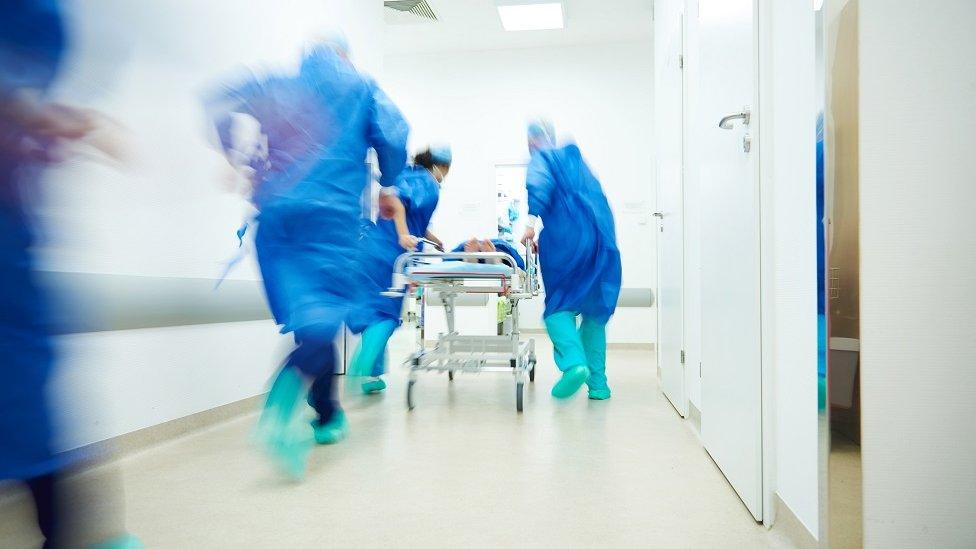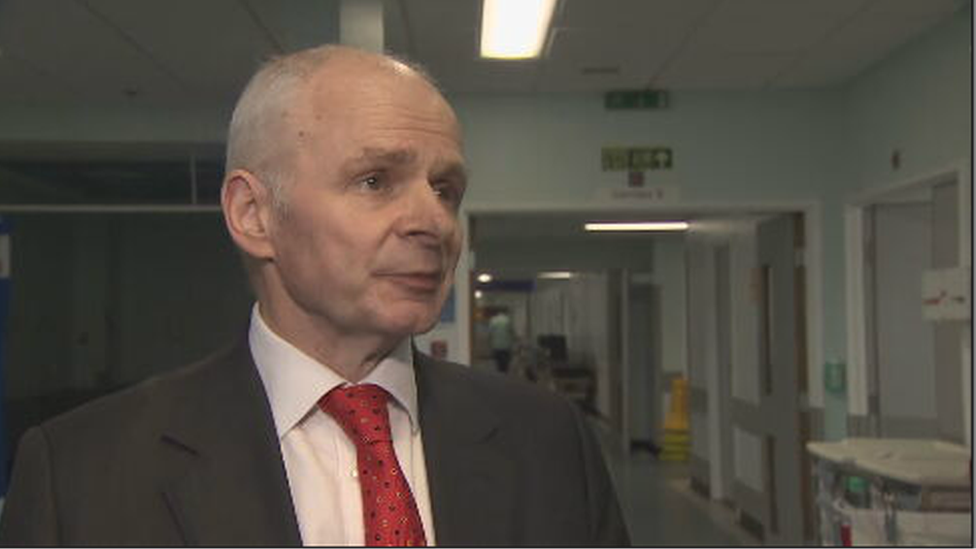Waits increase amid surge in A&E demand
- Published

Waiting times in Scotland's accident and emergency units reached record levels amid a surge in demand in the lead up to Christmas.
The weekly statistics showed that 81.1% of A&E patients were seen within four hours in the week ending 17 December.
This was well below the Scottish government's 95% target, and the lowest since the weekly figures began in February 2015.
Health bosses said icy weather had led to "exceptional" demand on the units.
And Health Secretary Shona Robison told BBC Scotland that the system had been "overwhelmed" by an "unprecedented" combination of orthopaedic trauma cases and patients seeking treatment for flu-like symptoms.
More than 29,000 people attended emergency departments in the week ending 17 December - about 3,200 more than the previous week, and 3,800 more than the comparable week last year.
Scottish health boards are required to ensure that people who attend A&E are admitted, transferred or discharged within four hours.
The latest statistics, external, published by ISD Scotland, revealed that just 81.1% of people spent less than four hours in the department - well short of the 95% target.
In the same week last year, the figure stood at 90.2%, and in 2015 it was 93.7%.
Best in the UK
The report also revealed an increase in the number of people spending more than eight hours in A&E.
It affected 783 people (2.7% of the total) in the week ending 17 December 2017, compared to 252 patients in the same week in 2016, and 106 in 2015.
In October, the BBC showed how Scotland's performance on A&E waiting times was the best in the UK, with the Scottish NHS hitting its target three times in the previous 12 months.
England, Wales and Northern Ireland did not reach their targets once in the previous 18 months.

'We've asked patients to wait at home'

Graeme Foubister, the clinical director for trauma and orthopaedics at NHS Tayside, said demand for A&E services had reached its highest level in the 25 years he had worked for the health board.
"I've never seen anything like it," he told BBC Scotland.
"We've had so much that we've had to leave a lot of patients, ask them to go home, and wait with their fractures, their broken ankles and wrists.
"We normally get [them] back within a day or two, and sometimes people have been home for three or four days or longer.
"We've had to stop all our elective operating, all our scheduled care for knees and hips has all been abandoned, we've had to run two or three lists to get through to bring people in."

A&E attendances were up 12% on the previous week, and up 15% on the same week last year, with much of the increase attributed to weather-related slips and trips and seasonal illness.
Much of the rise in demand came towards the end of the week.
Raigmore Hospital in Inverness and Aberdeen Royal Infirmary saw a 48% and 42% increase respectively in attendances between Thursday December 14 and Sunday 17 compared with the same few days in the previous week.
Meanwhile, Hairmyres Hospital in East Kilbride reported receiving one week's worth of ice-related trauma demand in one day.
The Scottish Ambulance Service also recorded a 40% increase in calls to deal with trauma injuries during the week ending 17 December, and a 60% increase in calls related to falls over the weekend of 16 and 17 December.

Key statistics:
29,054 people attended A&E departments in Scotland during the week ending December 17
81.1% were admitted, transferred of discharged within four hours
783 (2.7%) of people spent more than eight hours in A&E
241 (0.8%) were in A&E for more than 12 hours.

On a visit to Ninewells A&E in Dundee, Ms Robison said that the health service was "in the midst of a winter with exceptional pressures".
She added: "The last couple of weeks have been combination of orthopaedic trauma cases - one of the doctors here was telling me that it's the worst he's seen in 25 years. So, unprecedented levels of orthopaedic trauma.
"On top of that, flu-like illnesses impacting straight away on the back of that. So we prepare for winter, but when you have pressures like this it does overwhelm the system.
"What we need to do now is help the system recover and that is exactly what is happening here at Ninewells and the rest of Scotland."
David Chung, vice president of Royal College of Emergency Medicine (RCEM) Scotland said: "We have seen exceptional numbers of patients in the week before Christmas, which will undoubtedly affect how we are able to work through the festive period as well.
"RCEM is proud of the way those working in our emergency departments, and our other colleagues in health and social care, in their commitment and dedication over this festive period."
Scottish Conservative health spokesman Miles Briggs claimed that the figures "prove that the SNP have totally mismanaged our NHS, and the situation won't improve until they start to seriously invest in primary care."
And Anas Sarwar, Scottish Labour's health spokesman, said medical staff were "over-worked, under-valued and under-resourced" and that "Scotland is facing an A&E winter meltdown under the SNP.